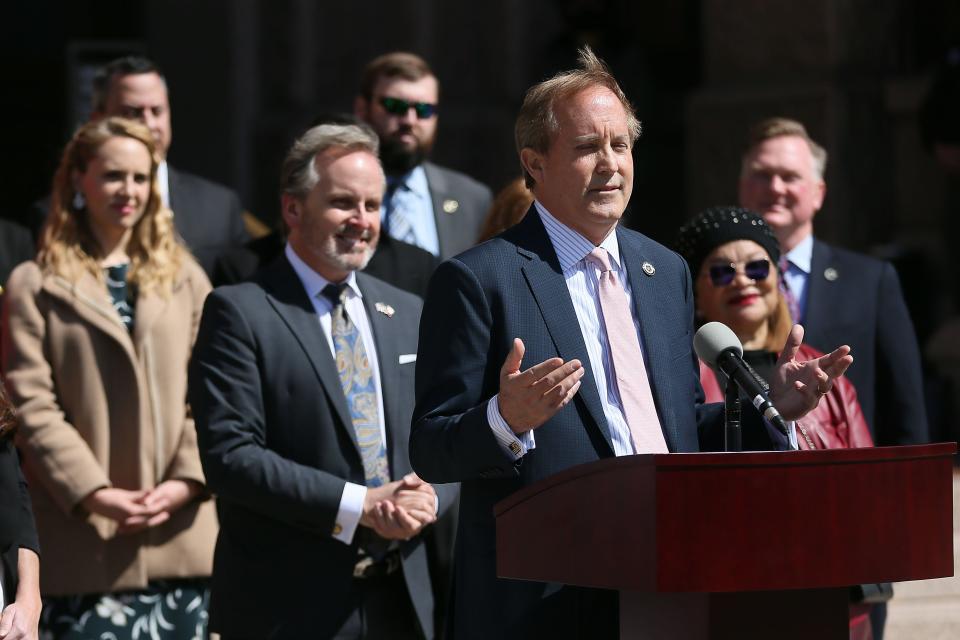Texas' anti-abortion heartbeat law aimed to save babies, but more infants died.
Texas lawmakers touted their heartbeat law as an effort to save lives, but the state's near-total ban on abortion appears to have triggered an increase in infant deaths, according to a new study published Monday.
The findings in JAMA Pediatrics show that infant deaths rose after Texas’ Senate Bill 8, which banned all abortion after about six weeks from conception. S.B. 8 became Texas law in September 2021 and U.S. Supreme Court overturned the constitutional right to abortion just over nine months later, on June 24, 2022. The high court ruling in the Dobbs case prompted more than a dozen states to issue near-total bans on abortion. Observers speculate that evidence will also show increases in infant deaths in those states, akin to what Texas has seen, the study said.
“It just points to some of the devastating consequences of abortion bans that maybe people weren't thinking about when they passed these laws,” Alison Gemmill, an assistant professor at Johns Hopkins University’s Bloomberg School of Public Health who authored the study, told USA TODAY. She called the deaths following the Texas heartbeat law its “spillover effects on moms and babies.”
Abortion bans: More than 171K patients traveled out-of-state for abortions in 2023, new data shows

In the wake of the law's passage in Texas, more babies died before their first birthday, likely due to birth defects or genetic problems that wouldn't have allowed them to live, the study found. These pregnancies would typically have been terminated by abortion, according to researchers. The Texas heartbeat law does not provide exceptions for pregnancies involving such conditions. Mothers are legally obligated to carry these babies to birth under state law.
In the peer-reviewed Journal of the American Medical Association, Gemmill and researchers from Johns Hopkins and Michigan State University wrote that the Texas law was linked to "unexpected increases in infant and neonatal deaths" between 2021 and 2022. Prior research drew a correlation between the uptick in infant deaths and anti-abortion laws taking effect, however, no studies until now have attributed the fatalities directly to the laws prohibiting the termination of these pregnancies.
"Abortion care is an essential component of comprehensive healthcare, and when it is restricted, the human impacts are devastating," Wendy Davis, a senior adviser for Planned Parenthood Texas Votes, said in a statement. Davis, who filibustered for abortion rights when she was a Democratic state senator, noted that the study only covered 2022, not the results in 2023 and 2024 in the wake of a more restrictive abortion ban that came with the Dobbs decision. This "likely means the situation on the ground today is even more dire," Davis said.
Texas Gov. Greg Abbott's office did not dispute the study's findings but defended the Republican-controlled state's anti-abortion record. This effort included the 2021 heartbeat law "to save the innocent unborn, and now thousands of children have been given a chance at life," Andrew Mahaleris, a spokesperson for Abbott, said in a statement to USA TODAY. He said the governor has taken "significant action to protect the sanctity of life" and offered resources to expectant mothers "so they can choose life for their child."
Anti-abortion advocates also didn't contest the uptick in infant deaths cited in the study. Advocates for the heartbeat law and other legislation to restrict abortions say such bans protect life. They say terminating a fetus with a terminal illness is “choosing to kill that child intentionally.”
The overwhelming majority of such abortions happen before the fetus is viable. In Texas, legislation has dramatically reduced the number of abortions performed in the state.
Amy O’Donnell, a spokesperson for Texas Alliance for Life, said the study’s findings didn’t come as a surprise. She said babies born with disabilities and even fatal anomalies deserve a chance at life, even if that means a newborn dies after birth from a condition doctors anticipated would be lethal. The death of a child is not easy, she acknowledged. She noted that her nonprofit offers resources for families grieving from such losses.
“In Texas, we celebrate every unborn child's life saved. We treasure the fact that our laws are protecting women's lives,” she said. “We don't apologize for the fact that we don't support discrimination against children facing disabilities or fatal diagnoses in or out of the womb. And that's the line that we just believe should not be crossed.”
Gemmill, of Johns Hopkins, said babies that died shortly after being born with birth defects "probably caused a lot of unnecessary trauma to families."
Maternal health: Chronic hypertension has soared among pregnant women. Treatment is not keeping pace

The researchers examined death records beginning after the heartbeat law went into effect. The study created a “synthetic Texas” that simulated outcomes that would have happened had the law not been in effect and compared the numbers to national trends during that period. In 2021, 1,985 Texas infants died before their first birthday. The next year, with S.B. 8 in effect, the fatalities jumped to 2,240, a 12.9% increase that came as the U.S. experienced an overall increase of less than 2%. Deaths attributable to congenital anomalies or birth defects spiked nearly 23% in Texas compared to a 3% decrease nationally.
“It suggests that, really, this policy was responsible for this increase in infant deaths in Texas,” Gemmill said.
The study is significant because of Texas’ role as a conservative state with urban and rural areas that may reflect what happens in the rest of the U.S., according to Dr. Tracey Wilkinson, an associate professor of pediatrics and obstetrics and gynecology at the Indiana University School of Medicine. Texas has been living under restrictions longer than other states that enacted abortion bans after the Dobbs ruling.
“When people ask me why this is happening, it’s really simple,” said Wilkinson, who was not involved with the new study. “When you take away people’s ability to make decisions (about) if and when they have pregnancies, you’re going to see outcomes like increasing infant and maternal mortality.”

The study did not examine the effects of infant deaths on the health of mothers who were legally required to deliver dead babies to term, nor did it look at the mental health effects of carrying infants and delivering them, only to see them die. The study also raises but does not tackle questions about the financial cost to families of carrying and delivering terminally ill newborns.
Gemmill is now working to understand the impact of abortion restrictions on parents of different races and ethnicities. Prior research has shown that Black mothers and babies face higher death rates than other groups.
The study reflects what Molly Duane, a senior staff attorney at the abortion rights advocacy nonprofit Center for Reproductive Rights, has seen in the courtroom arguing against Texas' laws. She recently represented women who sued the state after they were denied medical abortions. One of her clients, Samatha Casiano, was required by law to carry a child that developed without a brain. In late May, the Texas Supreme Court ruled pregnant patients must have a “life-threatening condition” in order to terminate a pregnancy.
Duane questioned the claim by anti-abortion activists that Texas is a “pro-life” state, given the study's findings. “Women are hurting, families are hurting, babies are dying, and no one in the state is taking responsibility for any of that real human suffering,” she said.
In late 2023, a U.S. Centers for Disease Control and Prevention report found increases in infant deaths for the first time in more than 20 years. The states identified in the report with increased fatalities were states that restricted abortion access, however, experts cautioned at the time that they could not say what had caused the spike in fatalities.
The Texas study went one step further, finding one state where abortion restrictions resulted in more deaths.
This article originally appeared on USA TODAY: Texas anti-abortion heartbeat law led to more deaths after birth: study


